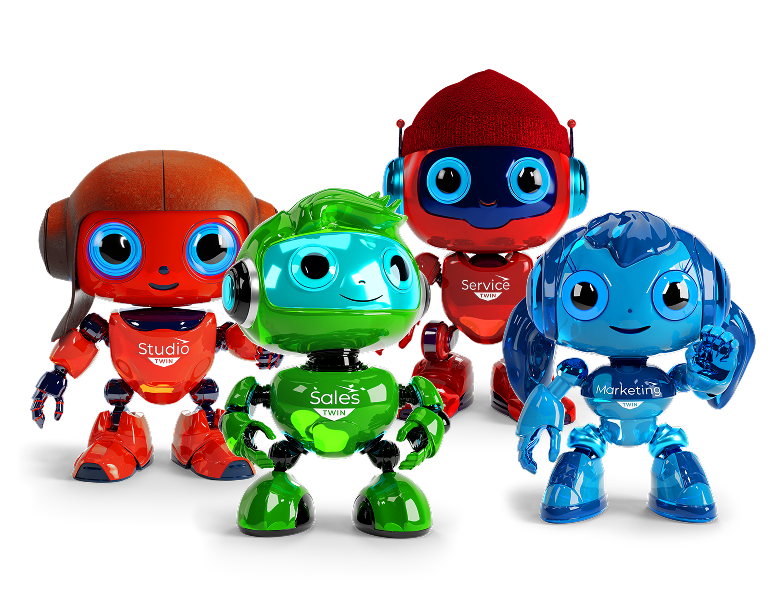-
No-Code
Platform
-
Studio
No-code agentic platform delivering the fastest time-to-value and the highest ROI
-
Studio
-
AI-Native CRM
CRM
-
AI-Native CRM
New era CRM to manage customer & operational workflows
CRM Products -
AI-Native CRM
- Industries
- Customers
- Partners
- About
AI in Customer Service: How AI Agents and Chatbots Transform Support
Updated on
November 05, 2025
12 min read
Cut Customer Service Expenses With Creatio.ai

According to Qualtrics research, customers still prioritize value, but those who choose brands for their excellent customer service report 94% higher satisfaction and 89% higher trust. It’s no surprise, then, that improving customer experience has become the top strategic priority for 71% organizations surveyed by Forrester.
As expectations for faster and more personalized support continue to rise, businesses are increasingly adopting AI-powered customer service solutions. According to Creatio’s Global AI and No-Code Adoption Survey, 2025, nearly one in five AI agents worldwide is already deployed in customer service functions. Moreover, Servion Global Solutions predicts that by 2028, 95% of all customer interactions will be powered by AI, signaling a fundamental shift toward intelligent, automated customer engagement.
In this article, we’ll explore how AI service agents are reshaping customer service, the operational advantages they bring, and real-world use cases.
Key takeaways
- AI is transforming customer service by handling routine customer inquiries, automating repetitive tasks, providing data-driven recommendations, offering predictive support, and forecasting future needs.
- AI delivers measurable business outcomes: faster resolutions, increased personalization, lower operational costs, and higher CSAT and retention rates.
- Successful AI adoption requires selecting the right use cases and tools, implementing strong governance and security measures, incorporating human oversight, and ensuring clear alignment with brand voice and compliance standards.
- Platforms like Creatio’s agentic CRM empower organizations to integrate AI seamlessly into every stage of the customer journey, significantly increasing adoption and lowering costs.
What is AI in Customer Service?
AI in customer service uses artificial intelligence technologies, such as chatbots, AI service agents, machine learning algorithms (ML), and natural language processing (NLP), to automate and personalize customer interactions.
These intelligent entities integrate with customer service solutions to handle typical customer inquiries, provide instant and personalized responses, and support customers 24/7 across multiple channels. By analyzing large volumes of interaction data, AI enables organizations to respond faster, ensure consistency, and deliver more tailored, human-like customer experiences.
The State of AI Agents & No-Code
Learn how 560+ leaders across the world use AI and no-code to drive innovation today
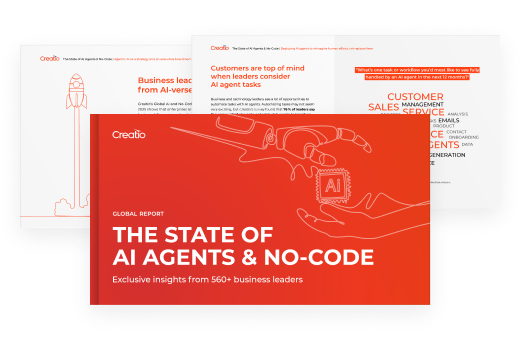
Benefits of AI in Customer Service
Integrating AI into customer service operations yields tangible, measurable results: companies report significant reductions in response times and operational costs, alongside improvements in customer satisfaction and loyalty.
According to Zowie, AI-powered virtual assistants can automate over 70% of all customer queries, delivering relevant and personalized responses without human intervention. Forrester’s 2024 Generative AI report found that chat agents using generative AI tools can increase their case resolution per hour by up to 14%, while VentureBeat reports that implementing AI in customer service can reduce operational costs by up to 30%.
Key benefits of AI in customer service include:
- 24/7 support: AI chatbots and virtual assistants provide continuous, round-the-clock assistance to customers and employees across channels, time zones, and languages.
- Cost savings: Automating routine interactions with AI agents can help reduce staffing, training, and customer service costs.
- Personalized experiences: Generative AI uses customer data to deliver tailored recommendations and context-aware responses that enhance customer satisfaction and loyalty.
- Proactive support: By analyzing data in real-time, AI agents can anticipate customer churn or service failures and prompt human agents to intervene before they escalate.
- Faster response times: AI in customer service enables instant replies and quicker resolutions, which is critical, as nowadays most customers expect immediate support.
- Higher satisfaction and loyalty: Swift, accurate service improves customer satisfaction score (CSAT) and retention.
- Scalability during high demand: AI efficiently manages spikes in customer inquiries, maintaining consistent service quality without overburdening customer service teams.
- Multichannel integration: AI ensures seamless, unified support across multiple channels, including chat, email, social media, and phone.
- Data-driven insights: AI analyzes customer interactions to identify trends, optimize processes, and enhance decision-making, providing real-time support to human support agents.
How to Use AI in Customer Service?
AI can enhance customer service in many practical ways, from automating simple requests to predicting customer needs and improving human agent performance. The following use cases illustrate how organizations are applying AI-powered tools and service AI agents:
1. AI-powered chatbots for tier 0 and tier 1 customer questions
AI-powered chatbots are the frontline of modern customer service, designed to handle tier 0 and tier 1 customer queries: routine, high-volume questions that don’t require human attention. Customer service chatbots using conversational AI can simulate human-like conversations and manage thousands of interactions 24/7. They provide accurate responses to common and initial customer inquiries, as well as instant support with simple tasks, such as checking order status, resetting passwords, or scheduling appointments.
Gartner predicts that by 2027, chatbots will become the primary customer service channel for approximately 25% of organizations, indicating a significant shift toward automated and intelligent support systems.
By automating repetitive tasks and handling routine inquiries, chatbots free human agents to focus on more complex tasks and high-value issues, significantly improving team productivity and efficiency.
Creatio Service Implementation Bank of Georgia Use Case
Find out more about the benefits of chatbots in the banking industry

2. AI-powered virtual assistants for customer service agents
AI-powered assistance tools are revolutionizing customer service by providing real-time support and intelligence to human agents, enhancing their capabilities and efficiency.
AI virtual assistants, such as Creatio's AI agents, provide customer service teams with real-time help during customer interactions. Service AI agents can suggest relevant knowledge articles, similar cases, best practices, and playbooks, helping agents resolve issues faster and accurately. They also ensure that support representatives provide consistent and correct information to customers by updating information in the customer service systems.
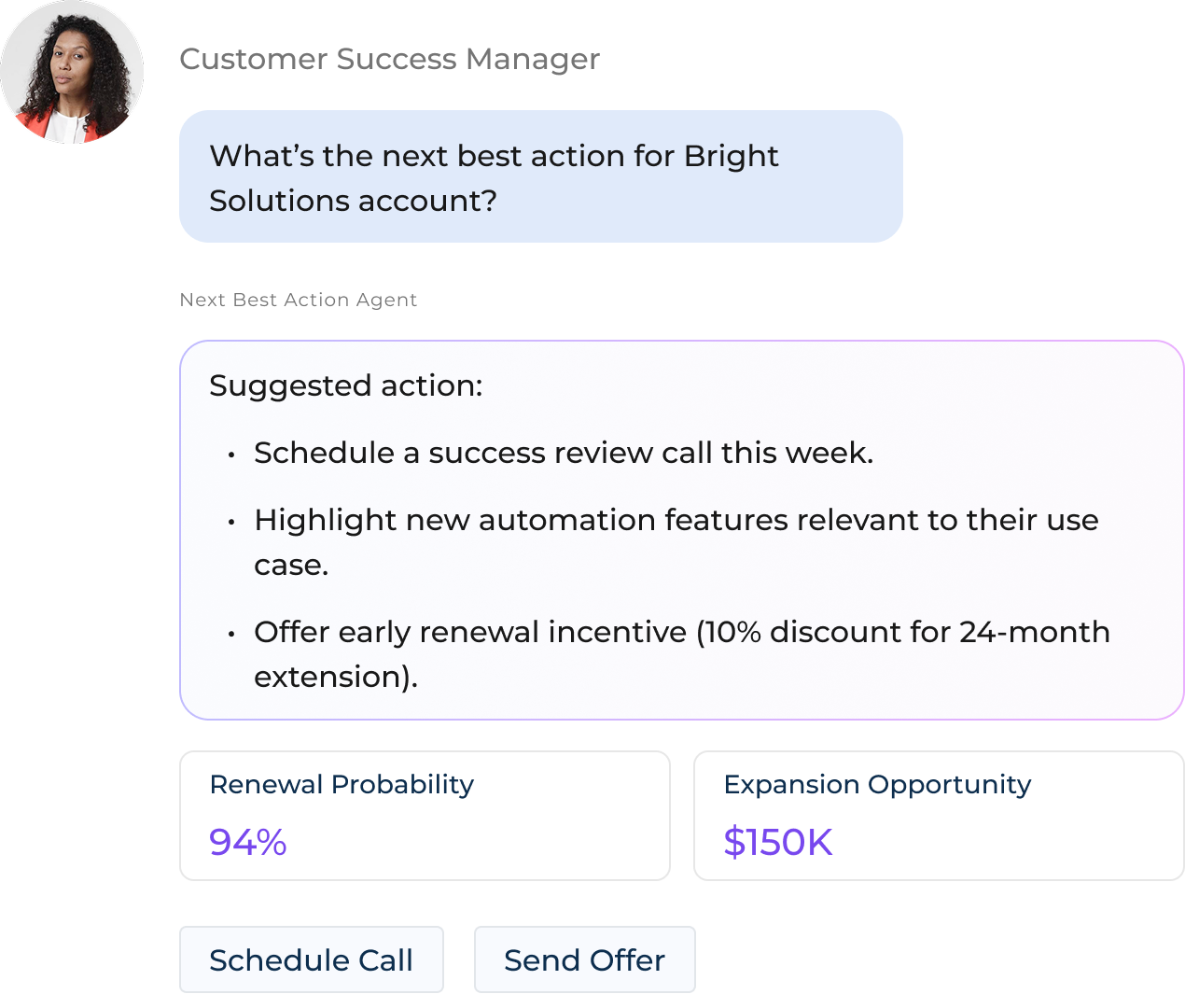
Moreover, AI assistance tools can analyze the current workload, status of support agents, and case details to automatically route cases. This ensures that each case is directed to the most suitable human agent, based on their expertise, availability, and the complexity of the case.
AI agents can also automate the documentation of customer interactions and follow-up tasks. After a call or chat, AI software can summarize entire conversations, write follow-up emails, and knowledge base articles. This allows support teams to focus on more important tasks, such as building customer relationships, rather than on administrative work.
3. Automated case routing & workflow orchestration
AI agents enhance customer service operations by automating case routing and autonomously orchestrating workflows across teams. Among other things, AI agents can analyze incoming support tickets, determine their urgency, and send a customer request to the right agent with a summary of the customer's profile and conversations, as well as response suggestions.
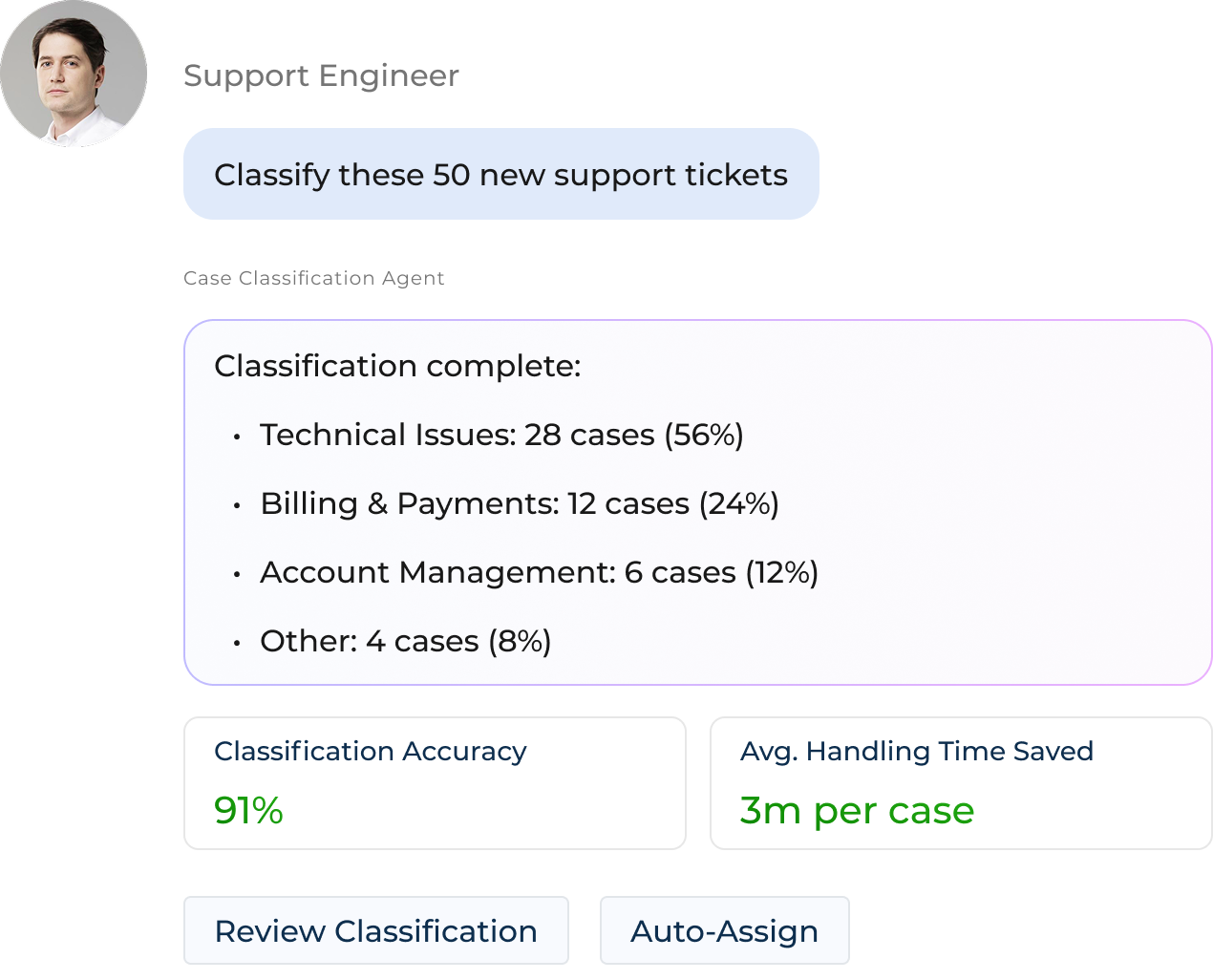
Gartner predicts that by 2030, more than 60% of enterprise customer service interactions will be managed entirely by agentic AI, resulting in a 35% reduction in average case handling time.
Beyond routing, AI systems streamline everyday tasks such as data entry, ticket categorization, and follow-up communication, enabling service teams to focus on complex issues and high-value interactions.
4. Improved call management
AI systems can enhance call management by using voice recognition and natural language processing to understand and route calls effectively. These systems can also provide customer support teams with real-time help by suggesting responses and providing relevant customer information during calls.
Generative AI can also generate summaries of conversations and interactions with chatbots or interactive voice response (IVR) systems. This allows customer service agents to easily return to a conversation and address additional questions without requiring customers to repeat themselves.
5. Personalized recommendations
AI enables truly personalized interactions by analyzing customer data, individual preferences, past interactions, and engagement patterns to provide a more tailored customer service experience. This enables service teams to suggest relevant solutions, content, or next steps quickly and efficiently.
A study by Medallia has shown that when brands deliver hyper-personalized experiences, companies are twice as likely to achieve revenue growth of 10% or more.
6. Sentiment and intent analysis
AI agents for customer service can analyze customer sentiment and intent, enabling organizations to understand not just what customers are saying, but how they feel.
By leveraging Natural Language Processing and Machine Learning, these systems analyze tone, word choice, and context across conversations to detect emotions such as customer frustration, satisfaction, or urgency, as well as the intent behind each message.
These insights help human customer service teams to respond with greater empathy and precision, automatically prioritizing escalations or routing negative sentiment cases to senior representatives
7. Predictive support
Based on insights from sentiment and intent analysis, AI agents can flag at-risk customers in real time and suggest retention actions before the customer leaves.
By analyzing emotional tone, intent signals, and behavioral patterns across past interactions, predictive models identify at-risk customers and trigger proactive outreach, such as timely follow-ups, personalized offers, or escalation to a live agent.
8. Forecasting and capacity planning
AI-powered predictive analytics help organizations forecast support demand and optimize resource allocation. By analyzing historical customer data, seasonal trends, and customer behavior, AI models can anticipate ticket volumes, peak times, and emerging issues. Based on that information, customer support teams can plan staffing levels and workloads more accurately, avoiding bottlenecks, lengthy wait times, and lowered service quality.
How to Implement AI in Customer Service
AI in customer service can be transformative, but starting on the right foot is crucial. Successfully adopting AI in customer service requires a strategic, phased approach that aligns technology with business objectives and customer expectations.
Here are five essential steps to guide implementation:
1. Define clear goals and align with leadership
First, define business objectives for AI implementation by setting clear metrics, such as reducing response times, improving CSAT, personalizing customer interactions, or lowering operational costs.
Involve your leadership at the early stages to ensure that your AI goals align with broader business objectives. Clear goals will shape your AI strategy and help plan improvements to increase the effectiveness of your AI tools.
2. Identify and prioritize AI use cases
Next, evaluate your existing customer service processes and workflows to find inefficiencies and areas where AI can add value. Understanding where AI can enhance your business performance is essential for effective integration.
The top challenge to achieving primary AI goals is the right selection of use cases, cited by 20% of executives and AI leaders surveyed by Gartner. According to another survey conducted by Gartner, only 10% of customer service and support leaders were able to achieve their goals for investments in generative AI.
To avoid disappointment, prioritize use cases that promise the highest return on investment while contributing to broader business goals. Evaluate the potential impact of implementing AI agents in each use case and dependencies on other initiatives.
Start with internal use cases (non-customer-facing), such as case summarization, sentiment analysis, and knowledge-based article generation. These use cases don’t involve customers directly, hence present lower risks when something goes wrong. External use cases (customer-facing), such as virtual assistants and AI agents for customer communication, require careful oversight to ensure ethical and regulatory standards and should be considered when the business achieves higher AI maturity.
3. Choose the right AI tools
Choosing the right platform is a critical step in this process. Select AI tools that seamlessly connect with your CRM and communication channels to ensure unified, data-driven customer experiences. The ideal solution should support multilingual and omnichannel engagement, provide robust data governance and security, and enable scalable integration across existing workflows.
Creatio’s agentic CRM stands out as a top choice due to its comprehensive AI capabilities, including role-specific AI agents, workflow automation, and real-time assistance. With extensive customization options and seamless integration with existing systems, Creatio encourages enterprise-wide adoption.
4. Be mindful of AI limitations and risks
While AI offers powerful capabilities, it also presents certain limitations and risks that businesses must consider. Generative AI systems can occasionally produce inaccurate or misleading responses, a challenge known as hallucination risk. Additionally, although 64% of customers prefer tailored experiences, only 39% trust that companies will use their data responsibly.
Ensuring human oversight, data accuracy, and robust compliance and security practices is critical to maintaining reliability and customer trust. To achieve this, businesses must eliminate siloed, inconsistent data and adopt platforms that seamlessly integrate tools across the technology stack while upholding the highest security standards.
Ultimately, realizing the full potential of AI requires a foundation of transparency, strong governance, and clear human-in-the-loop safeguards that keep automation aligned with organizational values and customer expectations.
5. Pilot and optimize
Start with a limited pilot of internal use cases to test accuracy and workflow integration. This is especially important for businesses with low AI maturity. When your maturity level increases and internal use cases are firmly established and tested, you can move on to implementing AI agents in external use cases.
After the initial implementation, continuously monitor AI performance and gather feedback from employees and customers to refine it. Stay agile and adapt to evolving customer needs and technological advancements.
6. Scale and govern
Once the pilot proves successful, expand AI capabilities across more use cases and departments. Establish ongoing governance to monitor compliance, mitigate risks like bias or hallucination, and ensure the AI remains aligned with brand voice and service standards.
Creatio Service - Boost Your Customer Satisfaction with Best-in-Class AI Agents for Customer Service
Creatio Service is a new era service platform to delight customers and drive service excellence with no-code and AI at its core. It enables businesses to manage the end-to-end service cycle, from case intake and routing to resolution and continuous improvement, with speed, accuracy, and agility.
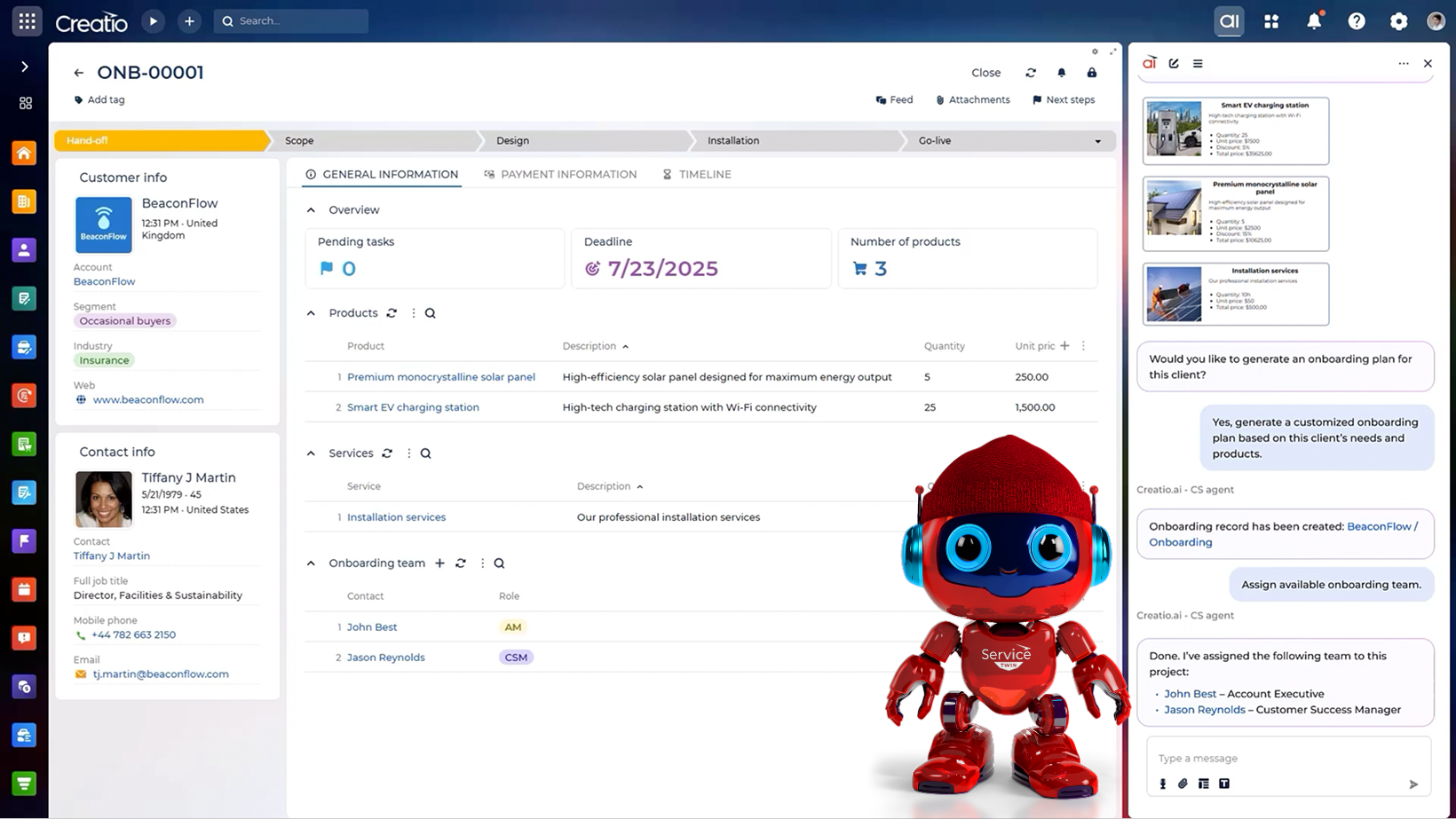
Creatio.ai enhances support teams' ability to deliver exceptional service by providing intelligent assistance for faster and more accurate case resolution. Creatio offers multiple best-in-class, ready-to-use AI agents for service automation, ensuring superior service and elevating customer satisfaction from day one.
Creatio’s AI Service Agents work together to automate routine tasks, accelerate resolutions, and elevate the customer experience. The Customer Support Agent handles FAQs and simple customer requests, seamlessly escalating complex cases to live agents when needed, while the Service Playbook Agent recommends next-best actions, empowering teams to deliver faster and more reliable service.
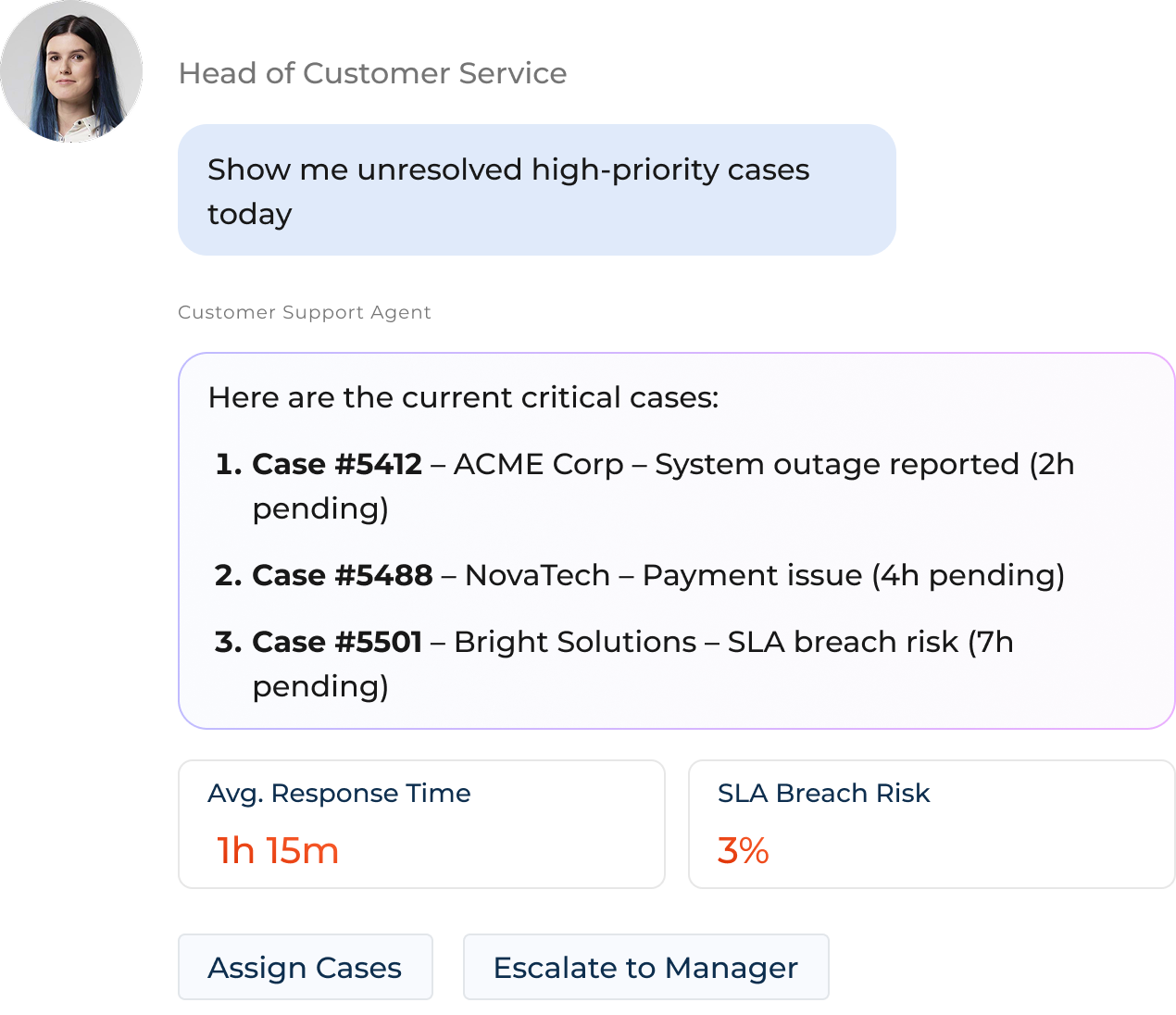
The Case Classification Agent categorizes requests, recommends solutions, and routes cases to the right team instantly, and the Knowledge Base Agent automatically generates help articles, suggests relevant content in real-time, and keeps documentation accurate and up to date. Finally, the Customer Success Agent leverages AI to create personalized onboarding plans, recommend tailored training materials, and analyze engagement metrics to increase AI adoption and satisfaction.
Whether you’re looking to boost first-contact resolution rates, reduce response times, or deliver more proactive and predictive support, Creatio Service AI agents give customer-facing teams the tools they need to operate efficiently, exceed customer expectations, and strengthen loyalty. Industry research highlights the impact of Creatio’s agentic CRM, showing that organizations achieve implementations up to 70% faster and realize a 37% lower total cost of ownership (TCO) compared to legacy systems.
The Future of AI in Customer Service
The future of AI in customer service is promising, with increasing adoption across various industries. According to Creatio’s State of AI Agents and No-Code report, AI has crossed the executive threshold and become a boardroom-level topic, signaling a major shift from experimentation to prioritization. Over 80% of C-level decision-makers already believe AI agents will be important or even critical to achieving their strategic goals within the next two to three years.
The next stage of customer service will be defined by AI-first operations, where intelligent systems take the lead, and human agents play more specialized, strategic roles. According to industry forecasts, service organizations are transitioning toward highly autonomous environments, where AI agents manage the majority of customer interactions, while human experts focus on complex customer issues, coach AI systems, and refine processes. The goal is not to replace humans with AI, but to build a collaborative partnership that combines the efficiency and scale of automation with the empathy, creativity, and judgment of human agents.
Forrester predicts that, by 2026, organizations that adopt a structured approach to AI implementation will likely see measurable gains in self-service success, with roughly one-quarter of brands achieving a 10% increase in the resolution of simple inquiries. Many will expand their use of generative AI-powered chat and voice bots that engage customers conversationally, enabling faster, more natural self-service.
Forward-looking organizations that embrace the AI revolution will not only reduce costs and response times but also create a more adaptive, intelligent, and scalable service ecosystem built for long-term success.
Summary
AI is redefining what great customer service looks like. From automating routine inquiries to delivering personalized, predictive, and proactive support, AI service agents empower organizations to meet rising customer expectations with speed and precision. Businesses that embrace this transformation are achieving measurable gains in efficiency, satisfaction, and loyalty, while positioning themselves for long-term success in an AI-first world.
As technology continues to evolve, the most successful companies will be those that strike a balance between automation and human empathy, ensuring every customer interaction remains intelligent, seamless, and deeply personal.





















































